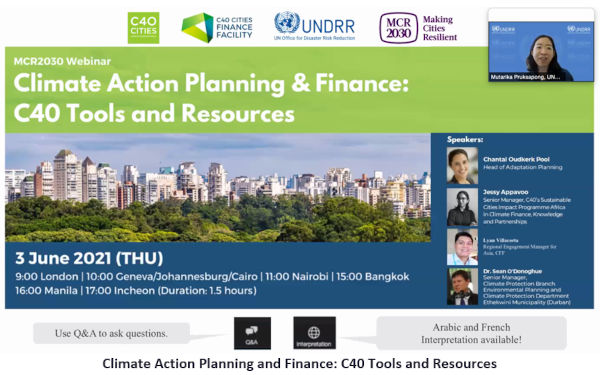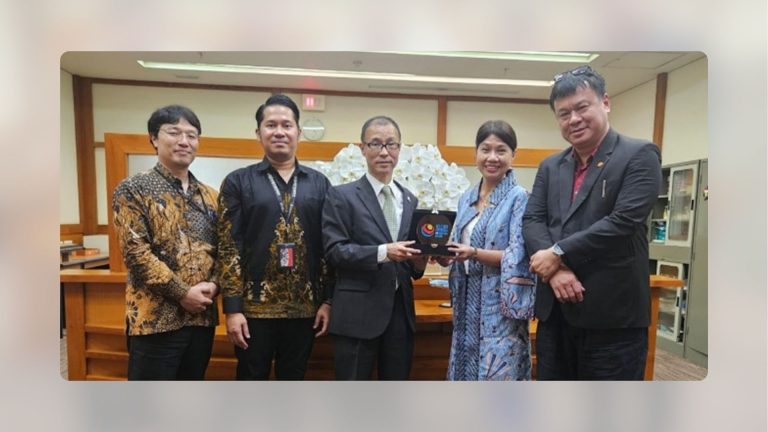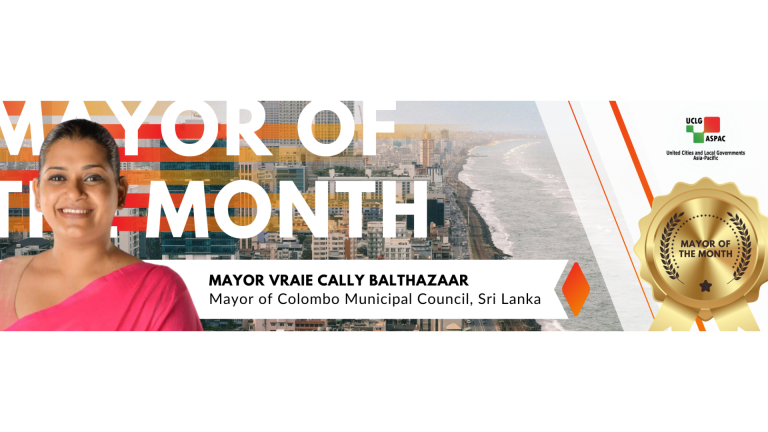In strengthening its commitment to tackle climate change, the United Nations Office for Disaster Risk Reduction (UNDRR) made an appearance in the event titled “Climate Action Planning & Finance: C40 Tools and Resources”on 3rd June 2021. A representative of the UNDRR, Sanjaya Bathia, engaged four speakers in providing an introduction to C40 Cities network.
The event itself was delivered in the format of a webinar organized by C40 Cities & C40 Cities Finance Facility (CFF), the UNDRR Global Education and Training Institute (GETI), and the Making Cities Resilient 2030 (MCR2030). Besides providing an introduction to the C40 Cities network, the webinar also provided further introduction to C40’s service offered by its Adaptation Programme and Climate Finance Facility.
By providing access and tools for disaster risk reduction, the service is prospected to be able to support cities along the resilience roadmap. Chantal Oudkerk Pool, Head of Adaptation Planning of the C40 Cities Climate Leadership Group, shared the way the C40’s Climate Action Plan (CAP) is consistent with the objectives of global climate action agendas, such as the Paris Agreement at the beginning of her session.
To sum up, C40’s Climate Action Planning objectives is similar to the agreement in keeping global average temperature rise to below 1.5C above pre-industrial levels. It also includes coherent steps forward that cities can take in achieving the goals of the Paris Agreement.
The framework of the C40’s CAP reinforces the realistic and feasible actions to deliver on the Paris Agreement by means of thorough planning, and specific strategizing as there is no exact measures that fits every situation of all cities to both reduce GHG emissions and adapt to the impacts of climate change. Indeed, she admitted that the C40 did not encourage city ranking as there were many ways to measure it, “It’s actually impossible to compare cities,”she added.
The webinar also overviewed some tools and resources that can be deployed into concrete climate action plan for cities, than can be accessed on the C40’s website. To name a few, she included key tools and resources such as: (1) paperworks to fill out for assessing the climate change risks in cities; (2) mapping for understanding the infrastructure interdependencies in cities; and (3) a guide to follow for assessing the rapid climate risks.
This C40’s climate action planning framework and its resources are in line with UCLG ASPAC’s fundamental concerns on climate change adaptation in the Asia-Pacific region, as part of nurturing sustainable development. Cities are at the core of climate action and adaptation, and the right resources is key to creating a good enabling environment for local governments to create effective and inclusive climate action plans.
During the webinar, representatives from C40 cities demonstrated best practices and experiences in climate action planning. Jessy Appayoo, Senior Manager of the C40’s Sustainable Cities Impact Programme Africa in Climate Finance, Knowledge and Partnerships, elaborated the current situation at the city of Durban in adapting to climate change.
For example, recurring flood damage is a pressing concern. This has turned into a challenge for various stakeholders in Durban, particularly in developing a business case of upscaling the mitigation programme into a more citywide adaptation programme. This challenge indicates the need of linking cities to financial institutions, to which she suggested that, “It’s not the lack of finance that is hindering the climate action, but the lack of bankable projects,” she said. In responding to financing issue, Lyan Villlacorta as Regional Engagement Manager for Asia of the C40 CFF, saw eye to eye with Jessy Appavoo in supporting cities to be the eligible recipients.
Furthermore, Senior Manager of the Climate Protection Branch, Environmental Planning and Climate Protection Department, Ethekwini Municipality (Durban), Dr. Sean O’Donoghue mentioned some examples of simple projects that require no extensive costs and are eligible for financial assistance.
As an illustration, generating energy from ocean and utilizing wastewater for garden drainage systems are feasible for university students to participate in. Therefore, the webinar also concluded that the climate action decision-making process by universities and governments can prove to be cost-effective and innovative.
By KM Team











